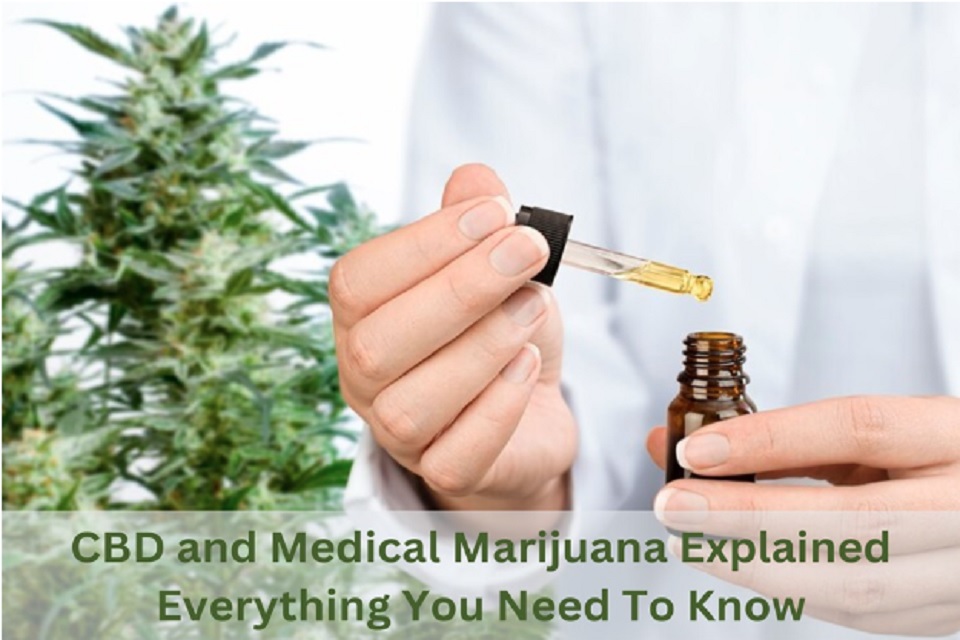CBD & Medical Marijuana Explained: A Comprehensive Guide
In the dynamic landscape of wellness, CBD (cannabidiol) and medical marijuana have risen to prominence, each offering a distinct array of benefits and applications. This comprehensive guide aims to provide a thorough understanding of these substances, equipping you with the knowledge needed to navigate the intricacies of the CBD and medical marijuana landscape.
CBD: Your Versatile Wellness Ally
Cannabidiol (CBD), derived from hemp plants, stands out for its non-psychoactive nature, ensuring that it doesn’t induce a “high” commonly associated with marijuana use. Its generally legal status and availability in various forms, such as oils, capsules, edibles, and topicals, make it a versatile option for those pursuing therapeutic benefits, CBD offers relief without inducing psychotropic effects.
CBD engages with the body’s endocannabinoid system (ECS), overseeing crucial functions such as sleep, mood, and appetite. Research suggests its potential anti-inflammatory and neuroprotective properties, contributing to its popularity in holistic wellness.
Key Aspects Of CBD:
| Key Aspects of CBD | |
| Primary Compound | Cannabidiol (CBD) |
| Source | Hemp plants |
| Psychoactive Effects | Non-psychoactive |
| Legal Status | Generally legal when derived from hemp |
| Potential Benefits | Address various wellness concerns, including anxiety, pain relief, and general well-being |
| Prescription Requirement | Typically available over the counter |
| Product Forms | Oils, capsules, edibles, topicals, etc. |
| Accessibility | Widely available over the counter |
| Targeted Use Cases | General wellness, anxiety management, pain relief |
Medical Marijuana: Merging Cannabis With Medicine
Medical marijuana, derived from cannabis plants, combines CBD and Tetrahydrocannabinol (THC), the compound accountable for the psychoactive effects linked to marijuana use. While subject to specific regulations and legal constraints, medical marijuana, available in forms like flowers, concentrates, and edibles, caters to individuals dealing with chronic pain, nausea, and other medical conditions.
Key Aspects Of Medical Marijuana:
| Key Aspects of Medical Marijuana | |
| Primary Compounds | CBD and Tetrahydrocannabinol (THC) |
| Source | Cannabis plants |
| Psychoactive Effects | Psychoactive due to THC content |
| Legal Status | Legal in some regions with specific regulations |
| Potential Benefits | Therapeutic benefits, particularly in managing chronic pain, alleviating nausea, and addressing specific medical conditions |
| Prescription Requirement | Often requires a doctor’s prescription |
| Product Forms | Flowers, concentrates, edibles, etc. |
| Accessibility | Prescription-based, subject to regulations |
| Targeted Use Cases | Specific medical conditions like chronic pain, nausea |
Navigating Wellness: Informed Decision-Making
Having an understanding of CBD and medical marijuana enables individuals to make educated decisions that align with their wellness objectives. It’s essential to recognize that individual responses may vary, underscoring the importance of consulting healthcare professionals for personalized guidance.
Key Considerations:
- Dosage Guidance: Both CBD and medical marijuana require careful dosage considerations. Starting with lower doses allows individuals to assess their tolerance and gradually adjust for optimal effects.
- Legal Landscape: Stay informed about the legal status of CBD and medical marijuana in your region. Regulations can vary significantly, influencing accessibility and usage.
As you embark on your exploration of the expansive world of CBD and medical marijuana, this guide serves as your comprehensive companion, ensuring a nuanced understanding for a well-informed and personalized wellness journey. May your choices be informed, your journey enlightening, and your well-being uniquely prioritized.
Note: The content shared is for informational purposes exclusively and is not a substitute for medical advice. For personalized guidance concerning your health, consult with a qualified healthcare professional.
FAQs
Is CBD legal everywhere?
CBD legality varies globally and locally. Ensure compliance with regional regulations for CBD products.
CBD vs. THC: What’s the difference?
CBD is non-psychoactive, providing therapeutic benefits, while THC induces a “high” and is psychoactive.
Medical vs. Recreational Marijuana: How do they differ?
Medical marijuana is prescribed for health conditions, containing CBD and THC, while recreational use is for personal enjoyment.
Are there side effects of CBD and medical marijuana?
Possible side effects include fatigue (CBD) and psychoactive effects, dizziness (medical marijuana). Start with lower doses and consult healthcare professionals for guidance.





